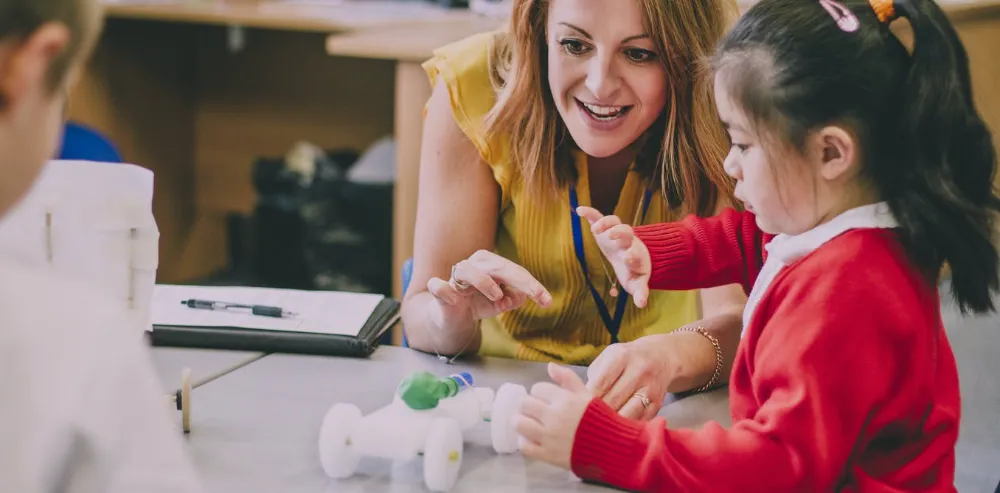DECE Course Details

Source: kaplanco
DECE Course Details
Anyone hoping to have a lasting influence on a child’s formative years must comprehend the critical function of early childhood education. The Diploma in Early Childhood Education (DECE) is a program that has been specially created to give aspiring teachers the abilities and information needed to create a supportive learning environment for young brains.
The DECE Course details comprises of essential aspects such as
- Child psychology and developmental stages
- Curriculum planning and execution
- Classroom management techniques
- Legal and ethical considerations in childcare
Through a blend of theory and practical sessions, the DECE course aims to create well-rounded educators capable of adapting to the evolving educational landscape. The course offers a thorough overview of what it takes to succeed in the field of early childhood education, covering everything from parent communication that works to developing age-appropriate lesson plans.
As a consequence, graduates are not only qualified for interesting employment prospects but are also well-equipped to significantly impact the lives of young students. So, your first step in realizing your desire to have a fulfilling job in this profession is to comprehend the DECE Course Details.
Table of Content

Source: noisyplanet
DECE Course Full Form
Aimed at those who wish to specialize in educating young children, the DECE Course combines both theory and practice.
The DECE Course Full Form stands for Diploma in Early Childhood Education which prepares educators to teach kids from 3 to 6 years in an innovative manner using a combination of hands-on play way activities and learning by discovery.
DECE Course Benefits
As the importance of Early Childhood Education continues to gain recognition, various career opportunities have emerged for those certified in this area. A completed course opens up a multitude of job avenues where you can make meaningful contributions.
The following are some of the DECE Course Benefits or job roles you can explore.
Career Paths
Primary-Level Teacher for Young Children
Be an educator in the pre-primary section of prestigious schools, implementing interactive learning experiences.
Preschool Founder
Start your preschool establishment or join a franchise, focusing on early educational practices.
Child Advocacy at NGOs
Work with top nonprofits committed to child betterment, applying your skills where they’re needed most.
Kindergarten Teaching Expert
Teach in established kindergartens, applying play-based education models for whole-child development.
Assistant Teacher in Nursery
Provide support in nursery classes, utilizing modern educational methods to help children learn effectively.
Learning Material Creator
Develop effective and stimulating educational resources that are both fun and educational for young learners.
Childcare Facility Head
Manage a childcare center, maintaining an atmosphere promoting healthy child development.
Daycare Administrative Lead
Oversee the daily functions of a daycare facility, making sure to meet all the needs of the children, from meals to educational activities.
DECE Course Apply Online
Online Learning has revolutionized the way education can be gained by aspirants who wish to pursue further studies. DECE Course Apply Online has been made extremely hassle-free at Vidhyanidhi Education Society a teacher training Institute with over 2 decades of valuable experience in the field of education.
Discover how a DECE certification from VES can prepare you for a fulfilling teaching career in the early childhood sector.
The DECE Course details for the Online mode have been listed below;
Current Academic Framework
The syllabus is geared towards keeping you informed about recent educational practices.
Cost Savings
Remove the need for a daily commute, reducing your overall expenses.
Optimal Time Use
Customize your study schedule according to your daily routine.
Work-Life Harmony
The online setup allows you to continue with your other life responsibilities.
Helpful Course Facilitator
Every student is paired with a mentor for personalized educational support.
Value-for-Money Fees
Enjoy an economically priced educational experience.
Installment Options
Pay your tuition fees in manageable chunks.
Payment Versatility
Opt for the payment form that aligns with your financial situation.

Source: pinimg
DECE Course Duration
Depending on your educational background the DECE Course duration varies. Vidhyanidhi Education Society offers either a one-year UG Diploma in DECE for high school graduates or a two-year PG Diploma for college graduates. Additionally, a Fast Track mode is available for quicker course completion.
- A one-year course is available for students right after high school.
- A two-year course is designed for individuals with a bachelor’s degree.
- Opt for Fast Track if you wish to complete the program sooner.
DECE Study Material
The DECE course at VES is designed by leading professionals to ensure educators are equipped to nurture well-balanced young learners who thrive in school settings.
The DECE study material is devised keeping in mind the current developments and latest advancements ensuring that the trainees get top-notch quality education.
Syllabus for Diploma in Early Childhood Education:
- Pre-Schooler Mental Health and Behavior
- Child Developmental Stages: Emotional, Social, Physical, Intellectual
- Lessons from Distinguished Educational Theorists
- Preschool Operational Guidelines
- Language Fundamentals and Literacy Skills
- Phonetic Studies
- Equal Education Opportunities
- Artistic Creations in the Classroom
- Body Movement and Rhythmic Exercises
- Tales, Lullabies, and Song Time
ECCEd Course Fees
At VES, affordability meets quality. Our goal is to set you on a path to a successful teaching career without financial worry. Therefore, at VES ECCED Course fees are priced at a cost that is easily affordable for everyone. With a variety of payment options—from GPAY to online transfers—covering your course fees is straightforward and convenient.

Source: thoughtco
DECE Course Jobs Salary
Equipped with a DECE certification, you can secure a rewarding job in India’s early childhood education sector. Your salary will be influenced by several factors like your skill set and the school’s location.
Typically, teachers may expect to make between 20,000 and 30,000 INR per month. Your income will probably be greater if you work for a global school. Joining VES’s Early Childhood Programs can set you on a successful career path.
After 12th Teacher Training Course
When it comes to teaching and educational administration, Vidhyanidhi Education Society (VES) stands as a pillar of excellence, offering an array of specialized courses designed to equip aspiring educators and administrators with the skills and knowledge they need to excel.
With a keen focus on quality education, VES ensures that its courses meet global standards. Let’s take a closer look at the variety of after 12th Teacher Training course you can choose from at VES.
Diploma and PG Diploma in Teacher Training
Early Childhood Education
Ideal for aspiring preschool teachers, focusing on developmental psychology, lesson planning, and classroom management.
Montessori Teacher Training
Targeted towards individuals interested in the Montessori method, emphasizing hands-on learning and student-led activities.
Nursery Teacher Training
Specialized for those who want to teach at the nursery level, covering areas like nutrition, first aid, and child psychology.
Primary Teacher Training
Designed for aspiring primary school teachers, offering techniques in subject-specific teaching and evaluation methods.
Diploma in Learning Disability
Introduction to Learning Disabilities
A foundational overview of different learning disabilities and their diagnosis.
Instructional Strategies
Offers techniques for individualized instruction and curriculum modification.
Assessment and Intervention
In-depth look at how to assess learning disabilities and intervene effectively.
Diploma in Special Education Need
Understanding Special Needs
Focuses on a variety of special educational needs, including Autism Spectrum Disorder, Down Syndrome, and ADHD.
Inclusive Education
Strategies to include children with special needs in mainstream classrooms.
Resource Room Management
Equips you with skills to manage a special education resource room.
Certificate in Shadow Teacher Training
Role of a Shadow Teacher
Explains shadow teachers’ critical role in inclusive education.
Behavioral Management
Provides techniques for managing challenging behavior.
Collaboration with Mainstream Teachers
Tips and techniques for effective collaboration to support the child’s educational journey.
School Administration and Management Courses
Educational Leadership
Develop the skills to be an effective leader in an educational setting.
Human Resource Management
Learn to manage staff effectively for a productive educational environment.
Financial Management
Get to grips with budgeting, funding, and resource allocation.
Phonics Teacher Training Program
Understanding Phonics
A deep understanding of the phonics system for teaching reading and spelling.
Lesson Planning
How to plan engaging lessons that make phonics learning effective.
Assessment Methods
Various tools to evaluate a child’s progress in phonics.
Grammar Teacher Training Programme
Foundations of Grammar
Understand the basic components of English grammar, from syntax to punctuation.
Teaching Strategies
Effective methods for teaching complex grammar rules.
Classroom Tools
Gain access to resources that make grammar lessons engaging and interactive.
At VES courses are designed with a clear-cut purpose to fit the demands of the contemporary educational landscape and therefore VES devises its teacher training programs with innovation.
Pursuing these programs ascertains trainees to embark on a successful journey of an excellent teaching career providing you with real-world information and insights from the business world.
So witness the biggest leap in your professional journey and enroll today to make a strong impact on the lives of young children.

Source: theconversation
What Does Early Childhood Education Do?
The early childhood period is an extremely crucial period that begins with the child’s birth till 8 years and is vital to a child’s development because it offers a structured and nurturing environment during these formative years. Preschools, nursery schools, and kindergartens are examples of ECE programs and institutions.
They serve the following crucial purposes:
Cognitive Development
ECE programs stimulate cognitive development by introducing children to basic academic concepts, language skills, math, and problem-solving. These early experiences lay the foundation for later learning.
Social and Emotional Development
ECE fosters social skills and emotional development by encouraging interactions with peers and adults. It helps children learn to communicate, cooperate, share, and manage their emotions.
Physical Development
ECE programs often include activities that promote physical development, such as playing games, sports, and outdoor play. These activities help children develop motor skills and a healthy lifestyle.
Language and Communication Skills
ECE is a critical period for language development. Children in ECE programs are exposed to rich language experiences, helping them develop vocabulary, listening skills, and the ability to express themselves effectively.
Preparation for School
ECE programs ease the transition to formal schooling by familiarizing children with a structured learning environment. They learn routines, and basic classroom rules, and become better prepared for kindergarten and beyond.
Cultural and Social Awareness
ECE programs often incorporate activities that promote cultural awareness and social understanding. This can include celebrating different holidays, learning about diverse backgrounds, and promoting tolerance and inclusivity.
Early Identification of Special Needs
ECE teachers and professionals are often trained to recognize early signs of developmental delays or learning difficulties. To properly treat these challenges, early intervention may be essential.
Parental Engagement
ECE programs frequently engage parents in their children’s education and provide them the opportunity to be active participants in their growth. This relationship between parents and educators is crucial for a kid to develop fully.
For additional clarity on course details, Please connect with us at the following numbers: +919869546913 / +919869866277.
If you wish to download the brochure, Click Here.
Play-Based Learning
ECCE programs thrive on the Playway methods and the significance it has in shaping a child’s mind. Children gain valuable social and emotional skills, problem-solving techniques, and world exploration via play.
Nurturing Creativity and Imagination
Through imaginative play, music, and the arts, ECE programs foster creativity and imagination. These pursuits encourage a child’s capacity for original thought and self-expression.
Nutritional and Health Support
Some ECE programs include meals and medical care, ensuring that kids get the nourishment and care they need and fostering their general well-being.
What Courses Do You Need For Early Childhood Education?
Depending on the nation, state, or educational institution you attend, you may require different courses to earn a degree in early childhood education.
However, the majority of early childhood education programs often include the following broad topics:
Foundations of Education
- Introduction to Education
- Educational Psychology
- History of Education
Early Childhood Development
- Child Growth and Development
- Cognitive Growth
- Social and Emotional Progress in Early Childhood
Curriculum Development and Instructional Methods
- Curriculum Planning in Early Childhood Education
- Methods for Teaching Math and Science
- Strategies for Teaching Language and Literacy
- Methods for Teaching Social Studies and Arts
Classroom Management
- Classroom Organization and Management
- Communication and Relationships in Education
- Guidance and Discipline in Early Childhood
Health and Safety
- First Aid and CPR
- Nutrition in Early Childhood
- Health and Safety in the Early Childhood Classroom
Special Education
- Inclusive Practices in Early Childhood Education
- Teaching Children with Special Needs
Assessment and Evaluation
- Assessment in Early Childhood Education
- Observation Techniques
Field Experience
- Practicum or Student Teaching in Early Childhood Education
Professional Development
- Issues and Advocacy in Early Childhood Education
- Professional Ethics in Early Childhood Education
Electives/Specializations
- Early Literacy Development
- Early Childhood Science and Environmental Education
- Multicultural Education in Early Childhood
General Education Requirements
Depending on the criteria of your educational institution, they could include but not be limited to courses in science, math, and English.
You will be better prepared to work as an early childhood educator if you finish these courses and take the necessary certification examinations. To find out the precise courses you must take to earn your degree, always check with your program.
DECE Course Details
“Transform your career with VES’s DECE program. Reserve your spot today!”
Need clarity on course details? Please connect with us on the following numbers: +919869546913 / +919869866277.
If you wish to download the brochure, Click Here.
FAQ
What is DECE Course?
DECE stands for Diploma in Early Childhood Education an upcoming lucrative job sector offered by Vidhyanidhi Education Society focusing on preschoolers in the age group of 3 to 6 years.
What is the Difference between ECCE and DECE?
ECCE (Early Childhood Care & Education) has a broader scope including child care, while DECE specifically targets early education skills.
What is DECE Qualification?
DECE qualification requires a minimum of 12th-grade education and candidates must be at least 18 years old to enroll in the course.




